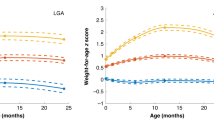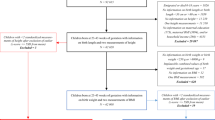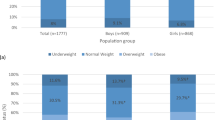Abstract
The association of rapid weight gain in early life with increased adiposity and obesity in later life has been established, whereas whether rapid neonatal weight gain predisposes individuals to other risk factors for cardiovascular disease and type 2 diabetes mellitus remains controversial. Gain in weight of >0.5 SD scores in the first 3 months of life (described as rapid weight gain) is associated with an unfavourable health profile in adulthood, and keeping weight gain below this threshold could reduce the risk of cardiovascular and metabolic diseases later in life. Weight gain above this threshold is not necessarily unhealthy if the increase is in proportion with the increase in length. As such, regular measurement of both the weight and length of all infants is important. Preterm infants and those who are born small for gestational age are most likely to have rapid weight gain, and are high-risk populations for unfavourable health profiles in adulthood.
This is a preview of subscription content, access via your institution
Access options
Subscribe to this journal
Receive 12 print issues and online access
$209.00 per year
only $17.42 per issue
Buy this article
- Purchase on Springer Link
- Instant access to full article PDF
Prices may be subject to local taxes which are calculated during checkout

Similar content being viewed by others
References
World Health Organization. Global atlas on cardiovascular disease prevention and control [online] (2011).
Kraushaar, L. E., Kramer, A. Are we losing the battle against cardiometabolic disease? The case for a paradigm shift in primary prevention. BMC Public Health 9, 64 (2009).
Zylke, J. W. & DeAngelis, C. D. Health promotion and disease prevention in children: it's never too early. JAMA 301, 2270–2271 (2009).
Leunissen, R. W., Kerkhof, G. F., Stijnen, T. & Hokken-Koelega, A. Timing and tempo of first-year rapid growth in relation to cardiovascular and metabolic risk profile in early adulthood. JAMA 301, 2234–2242 (2009).
Srinivasan, M. & Patel, M. S. Metabolic programming in the immediate postnatal period. Trends Endocrinol. Metab. 19, 146–152 (2008).
Kerkhof, G. F., Duivenvoorden, H. J., Leunissen, R. W. & Hokken-Koelega, A. C. Pathways leading to atherosclerosis: a structural equation modeling approach in young adults. Hypertension 57, 255–260 (2011).
Ong, K. K., Ahmed, M. L., Emmett, P. M., Preece, M. A. & Dunger, D. B. Association between postnatal catch-up growth and obesity in childhood: prospective cohort study. BMJ 320, 967–971 (2000).
Eid, E. E. Follow-up study of physical growth of children who had excessive weight gain in first six months of life. Br. Med. J. 2, 74–76 (1970).
Stettler, N. et al. Weight gain in the first week of life and overweight in adulthood: a cohort study of European American subjects fed infant formula. Circulation 111, 1897–1903 (2005).
Ekelund, U. et al. Association of weight gain in infancy and early childhood with metabolic risk in young adults. J. Clin. Endocrinol. Metab. 92, 98–103 (2007).
Chomtho, S. et al. Infant growth and later body composition: evidence from the 4-component model. Am. J. Clin. Nutr. 87, 1776–1784 (2008).
Larnkjaer, A. et al. Effect of growth in infancy on body composition, insulin resistance, and concentration of appetite hormones in adolescence. Am. J. Clin. Nutr. 91, 1675–1683 (2010).
Baird, J. et al. Being big or growing fast: systematic review of size and growth in infancy and later obesity. BMJ 331, 929 (2005).
Druet, C. et al. Prediction of childhood obesity by infancy weight gain: an individual-level meta-analysis. Paediatr. Perinat. Epidemiol. 26, 19–26 (2012).
Fabricius-Bjerre, S. et al. Impact of birth weight and early infant weight gain on insulin resistance and associated cardiovascular risk factors in adolescence. PLoS ONE 6, e20595 (2011).
Eriksson, J. G., Forsen, T. J., Osmond, C. & Barker, D. J. Pathways of infant and childhood growth that lead to type 2 diabetes. Diabetes Care 26, 3006–3010 (2003).
Eriksson, J. G., Osmond, C., Kajantie, E., Forsen, T. J. & Barker, D. J. Patterns of growth among children who later develop type 2 diabetes or its risk factors. Diabetologia 49, 2853–2858 (2006).
Jarvelin, M. R. et al. Early life factors and blood pressure at age 31 years in the northern Finland birth cohort. Hypertension 44, 838–846 (1966).
Law, C. M. et al. Fetal, infant, and childhood growth and adult blood pressure: a longitudinal study from birth to 22 years of age. Circulation 105, 1088–1092 (2002).
Kajantie, E., Barker, D. J., Osmond, C., Forsen, T. & Eriksson, J. G. Growth before 2 years of age and serum lipids 60 years later: the Helsinki Birth Cohort study. Int. J. Epidemiol. 37, 280–289 (2008).
Horta, B. L., Victora, C. G., Lima, R. C. & Post, P. Weight gain in childhood and blood lipids in adolescence. Acta Paediatr. 98, 1024–1028 (2009).
Euser AM, de Wit, C. C., Finken, M. J., Rijken, M. & Wit, J. M. Growth of preterm born children. Horm. Res. 70, 319–328 (2008).
Breukhoven, P. E., Kerkhof, G. F., Willemsen, R. H. & Hokken-Koelega, A. C. Fat mass and lipid profile in young adults born preterm. J. Clin. Endocrinol. Metab. 97, 1294–1302 (2012).
Barker, D. J., et al. Fetal nutrition and cardiovascular disease in adult life. Lancet 341, 938–941 (1993).
Leunissen, R. W. et al. Fat mass accumulation during childhood determines insulin sensitivity in early adulthood. J. Clin. Endocrinol. Metab. 93, 445–451 (2008).
Leunissen, R. W., Stijnen, T. & Hokken-Koelega, A. C. Influence of birth size on body composition in early adulthood: the programming factors for growth and metabolism (PROGRAM)-study. Clin. Endocrinol. (Oxf). 70, 245–251 (2009).
Leunissen, R. W., Gao, Y., Cianflone, K., Stijnen, T. & Hokken-Koelega, A. C. Growth patterns during childhood and the relationship with acylation-stimulating protein. Clin. Endocrinol. (Oxf). 72, 775–780 (2010).
Leunissen, R. W., Kerkhof, G. F., Stijnen, T. & Hokken-Koelega, A. C. Fat mass and apolipoprotein E genotype influence serum lipoprotein levels in early adulthood, whereas birth size does not. J. Clin. Endocrinol. Metab. 93, 4307–4314 (2008).
Leunissen, R. W., Stijnen, T., Boot, A. M. & Hokken-Koelega, A. C. Influence of birth size and body composition on bone mineral density in early adulthood: the PROGRAM study. Clin. Endocrinol. (Oxf). 69, 386–392 (2008).
Hokken-Koelega, A. C. et al. Children born small for gestational age: do they catch up? Pediatr. Res. 38, 267–271 (1995).
Levy-Marchal, C. & Czernichow, P. Small for gestational age and the metabolic syndrome: which mechanism is suggested by epidemiological and clinical studies? Horm. Res. 65 (Suppl. 3), 123–130 (2006).
Kerkhof, G. F., Willemsen, R. H., Leunissen, R. W., Breukhoven, P. E. & Hokken-Koelega, A. C. Health profile of young adults born preterm: Negative effects of rapid weight gain in early life. J. Clin. Endocrinol. Metab. (in press).
Singhal, A., Fewtrell, M., Cole, T. J. & Lucas, A. Low nutrient intake and early growth for later insulin resistance in adolescents born preterm. Lancet 361, 1089–1097 (2003).
Fanaro, S. Which is the ideal target for preterm growth? Minerva Pediatr. 62 (Suppl, 1), 77–82 (2010).
Yeung, M. Y. Postnatal growth, neurodevelopment and altered adiposity after preterm birth--from a clinical nutrition perspective. Acta Paediatr. 95, 909–917 (2006).
Morsing, E., Asard, M., Ley, D., Stjernqvist, K. & Marsal, K. Cognitive function after intrauterine growth restriction and very preterm birth. Pediatrics 127, e874–e882 (2011).
Eriksson, J. G. Early growth, and coronary heart disease and type 2 diabetes: experiences from the Helsinki Birth Cohort Studies. Int. J. Obes. (Lond). 30 (Suppl. 4), S18–S22 (2006).
Li, L., Pinot de Moira, A. & Power, C. Predicting cardiovascular disease risk factors in midadulthood from childhood body mass index: utility of different cutoffs for childhood body mass index. Am. J. Clin. Nutr. 93, 1204–1211 (2011).
Brisbois, T. D., Farmer, A. P. & McCargar, L. J. Early markers of adult obesity: a review. Obes. Rev. 13, 347–367 (2012).
Eriksson, J. G. Early growth and coronary heart disease and type 2 diabetes: findings from the Helsinki Birth Cohort Study (HBCS). Am. J. Clin. Nutr. 94 (Suppl. 1), 1799S–1802S (2011).
Mihrshahi, S., Battistutta, D., Magarey, A. & Daniels, L. A. Determinants of rapid weight gain during infancy: baseline results from the NOURISH randomised controlled trial. BMC Pediatr. 11, 99 (2011).
Herring, S. J., Rose, M. Z., Skouteris, H. & Oken, E. Optimizing weight gain in pregnancy to prevent obesity in women and children. Diabetes Obes. Metab. 14, 195–203 (2012).
Wijlaars, L. P., Johnson L, van Jaarsveld, C. H. & Wardle, J. Socioeconomic status and weight gain in early infancy. Int. J. Obes. (Lond). 35, 963–970 (2011).
Oyama, M., Nakamura, K., Tsuchiya, Y. & Yamamoto, M. Unhealthy maternal lifestyle leads to rapid infant weight gain: prevention of future chronic diseases. Tohoku J. Exp. Med. 217, 67–72 (2009).
Barker, D. J. Fetal origins of coronary heart disease. BMJ 311, 171–174 (1995).
Hattersley, A. T. & Tooke, J. E. The fetal insulin hypothesis: an alternative explanation of the association of low birthweight with diabetes and vascular disease. Lancet 353, 1789–1792 (1999).
Singhal, A. & Lucas, A. Early origins of cardiovascular disease: is there a unifying hypothesis? Lancet 363, 1642–1645 (2004).
Author information
Authors and Affiliations
Corresponding author
Ethics declarations
Competing interests
The authors declare no competing financial interests.
Rights and permissions
About this article
Cite this article
Kerkhof, G., Hokken-Koelega, A. Rate of neonatal weight gain and effects on adult metabolic health. Nat Rev Endocrinol 8, 689–692 (2012). https://doi.org/10.1038/nrendo.2012.168
Published:
Issue Date:
DOI: https://doi.org/10.1038/nrendo.2012.168
This article is cited by
-
Late preterm birth and growth trajectories during childhood: a linked retrospective cohort study
BMC Pediatrics (2023)
-
The LifeCycle Project-EU Child Cohort Network: a federated analysis infrastructure and harmonized data of more than 250,000 children and parents
European Journal of Epidemiology (2020)
-
The growth of assisted reproductive treatment-conceived children from birth to 5 years: a national cohort study
BMC Medicine (2018)
-
Early postnatal alteration of body composition in preterm and small-for-gestational-age infants: implications of catch-up fat
Pediatric Research (2015)
-
Circulating FGF19 and FGF21 surge in early infancy from infra- to supra-adult concentrations
International Journal of Obesity (2015)



